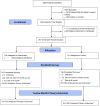Randomized controlled effectiveness trial of reciprocal peer support in heart failure
- PMID: 23388114
- PMCID: PMC3782294
- DOI: 10.1161/CIRCHEARTFAILURE.112.000147
Randomized controlled effectiveness trial of reciprocal peer support in heart failure
Abstract
Background: Although disease management programs for patients hospitalized with heart failure (HF) are effective, they are, however, often resource intensive, limiting their uptake. Peer support programs have led to improved outcomes among patients with other chronic conditions and may result in similar improvements for patients with HF.
Methods and results: In this randomized controlled trial, reciprocal peer support (RPS) arm patients participated in a HF nurse practitioner-led goal setting group session, received brief training in peer communication skills, and were paired with another participant in their cohort with whom they were encouraged to talk weekly using a telephone platform. Participants were also encouraged to attend 3 nurse practitioner-facilitated peer support group sessions. Patients in the nurse care management arm attended a nurse practitioner-led session to address their HF care questions and receive HF educational materials and information on how to access care management services. The median age of the patients was 69 years; 51% were female and 26% were racial/ethnic minorities. Only 55% of RPS patients participated in peer calls or group sessions. In intention-to-treat analyses, the RPS and nurse care management groups did not differ in time-to-first all-cause rehospitalization or death or in mean numbers of rehospitalizations or deaths. There were no differences in improvements in 6-month measures of HF-specific quality of life or social support. Conclusions- Among patients recently hospitalized for HF, more than half of RPS participants had no or minimal engagement with the RPS program, and the program did not improve outcomes compared with usual HF nurse care management.
Clinical trial registration: URL: http://www.clinicaltrials.gov. UNIQUE IDENTIFIER: NCT00508508.
Figures



Comment in
-
Does peer support help patients with heart failure? Finding the perfect match.Circ Heart Fail. 2013 Mar;6(2):151-2. doi: 10.1161/CIRCHEARTFAILURE.113.000182. Circ Heart Fail. 2013. PMID: 23513047 No abstract available.
References
-
- Krumholz HM, Merrill AR, Schone EM, Schreiner GC, Chen J, Bradley EH, Wang Y, Wang Y, Lin Z, Straube BM, Rapp MT, Normand SL, Drye EE. Patterns of hospital performance in acute myocardial infarction and heart failure 30-day mortality and readmission. Circ Cardiovasc Qual Outcomes. 2009;2(5):407–413. - PubMed
-
- Patient Protection and Affordable Care Act. Washington, DC: Government Printing Office; Public Law 111-148. http://www.gpo.gov/fdsys/pkg/PLAW-111publ148/content-detail.html.
-
- Cutler DM, Everett W. Thinking outside the pillbox--medication adherence as a priority for health care reform. N Engl J Med. 2010;362(17):1553–1555. - PubMed
-
- van der Wal MH, Jaarsma T. Adherence in heart failure in the elderly: problem and possible solutions. Int J Cardiol. 2008;125(2):203–208. - PubMed
-
- Krumholz HM, Parent EM, Tu N, Vaccarino V, Wang Y, Radford MJ, Hennen J. Readmission after hospitalization for congestive heart failure among Medicare beneficiaries. Arch Intern Med. 1997;157(1):99–104. - PubMed
Publication types
MeSH terms
Associated data
Grants and funding
LinkOut - more resources
Full Text Sources
Other Literature Sources
Medical
Research Materials
Miscellaneous

